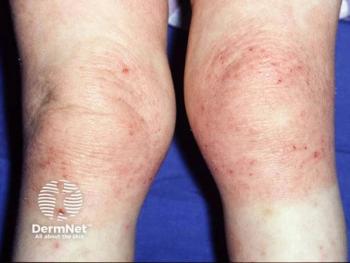
Oral JAK inhibitor appears safe, effective for atopic dermatitis
Eli Lilly and Incyte announces positive results of two phase 3 clinical trials investigating the use of JAK inhibitor baricitinib as both a monotherapy and combination therapy for moderate-to-severe atopic dermatitis.
The oral selective Janus kinase (JAK) inhibitor baricitinib (Olumiant, Eli Lily and Incyte) may be an effective, safe option for patients with moderate-to-severe atopic dermatitis (AD), according to results from two phase 3 clinical trials.
Researchers of a multicenter, double-blind, randomized, placebo-controlled study (BREEZE-AD4) investigated baricitinib in combination with topical corticosteroids (TCS) in AD patients outside of the U.S. whose disease did not respond well to cyclosporine, an immunosuppressant typically used to prevent organ rejection following transplants.
During the study, patients were either given 1 mg, 2 mg and 4 mg of baricitinib in combination with TCS. Participants that received the 4 mg dose of baricitinib plus TCS met the primary endpoint of the study by reaching a minimum improvement of 75% or greater from baseline in the Eczema Area and Severity Index (EASI) at week 16.
The safety profile of BREEZE-AD4 also coincides with findings from previous clinical trials that investigated baricitinib as a treatment for AD. Common treatment-emergent adverse events (TEAEs) included influenza, headache and nasopharyngitis; however, there were no deaths or venous thromboembolic events reported during this trial.
Lotus Mallbris, M.D., Ph.D., the vice president of immunology development at Lilly, says barcicitinib will not only expand their chronic skin condition portfolio, but will also allow Lilly to help fill the increasing need for additional treatments options for AD patients, especially those who have failed traditional treatments.
Investigators of a separate randomized, multicenter, double-blind, placebo-controlled phase 3 clinical trial (BREEZE-AD5) looked at the efficacy and safety of 1 mg and 2 mg doses of baricitinib as a monotherapy for moderate-to-severe atopic dermatitis in adult patients in North America.
Primary and secondary endpoints were reached by participants who received the 2 mg dose as these patients reached EASI75, experienced clear or almost clear skin and achieved a minimum 2-point improvement on the validated Investigator’s Global Assessment scale (vIGA 0 or 1) by week 16.
Additionally, the drug’s safety profile was consistent with data from previous trials; TEAEs included diarrhea, nasopharyngitis and upper respiratory tract infections, but there were no reported deaths or venous thromboembolic events in the trial.
“The results show the potential that baricitinib could offer as an additional treatment option to patients where there are otherwise limited choices," says Eric Simpson, M.D., MCR., global principal investigator for the BREEZE-AD5 clinical development program, professor of dermatology and director of clinical research at Oregon Health & Science University in Portland, Ore.
Currently, baricitinib is approved to treat rheumatoid arthritis in the U.S. and more than 60 countries. The company has submitted the drug for regulatory review in Europe for the treatment of moderate-to-severe AD and anticipates submitting it for approval in Japan and the U.S. during 2020.
References:
1. Lilly and Incyte Announce Positive Top-Line Results from the North American (BREEZE-AD5) Phase 3 Study of Oral Selective JAK Inhibitor Baricitinib in Patients with Moderate to Severe Atopic Dermatitis. Eli Lilly and Company. https://investor.lilly.com/news-releases/news-release-details/lilly-and-incyte-announce-positive-top-line-results-north. Published January 30, 2020. Accessed February 10, 2020.
2. Lilly and Incyte Announce Top-Line Results from Phase 3 Study (BREEZE-AD4) of Oral Selective JAK Inhibitor Baricitinib in Combination with Topical Corticosteroids in Patients with Moderate to Severe Atopic Dermatitis Not Controlled with Cyclosporine. Eli Lilly and Company. https://investor.lilly.com/news-releases/news-release-details/lilly-and-incyte-announce-top-line-results-phase-3-study-breeze. Published January 27, 2020. Accessed February 10, 2020.
Newsletter
Like what you’re reading? Subscribe to Dermatology Times for weekly updates on therapies, innovations, and real-world practice tips.











